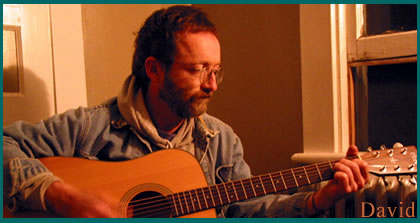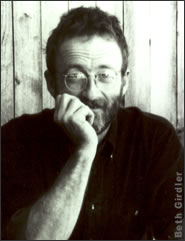
THE WAKING HOUR • David Francey
What makes a folk song a folk song? The question has been asked and answered a hundred different ways over time as the industry tries to define the music of one artist or another. The lines get more blurred as new music emerges and genres crossover and mix. As much as I love that alchemy and evolution (and feel vaguely resentful at the need for labeling), I didn't realize what a relief it would be to hear something purer, simpler, more...folk, until I listened to Canadian singer-songwriter David Francey's new album, The Waking Hour, and felt my whole body relax.
Francey's voice has a warm, brown burr and a pleasant lilt that reflects his upbringing in Scotland. His songs, too, are a natural blending of Old and New Worlds, both in style and content, as he deftly makes his way down highways and heartaches, around religion, through trains and bus stations and modern news stories.
There are songs with a Celtic feel, like the title track, in which Francey captures the first light of day and the dawning of doubt: "And I wonder will the girl I love / Come back with the morning / But the omen crow at the waking hour / Has given me fair warning." In other tracks, like "Morning Train" and "Sunday Morning," Francey turns to a country blues sensibility to give his take on matters of the spirit and the body. "He walked on the water / I walk on the ground / He went up to heaven / And I'm still coming down / It's a long way, a long way / A long way from Saturday night / It's coming Sunday morning / I'm a long way from feeling alright." He even turns his keen Canadian eye to the execution of the Oklahoma City bomber ("Wishing Well") and the U.S. one year after September 11th ("Fourth of July"). He captures strange moments and asks hard questions about them without sounding sanctimonious--not an easy thing to pull off. The thread that holds all these musical wanderings and musings together is his sure-footed songcraft. These songs are small and spare and perfect in their purity of line and heart. There's a sad sweetness here that isn't maudlin, but feels familiar and deeply soothing.
Francey's second and third albums won the Juno award (often described as Canada's Grammy) in the Roots and Traditional Album of the Year: Solo category. He recorded all his previous records in Canada, choosing to hone his voice as a writer and performer before inviting in other influences. For this, his fourth album, though, Francey came to Nashville to record with a trio of players, all fixtures of Nashville's other, cooler scene. Kieran Kane, Kevin Welch, and Fats Kaplin play guitars, mandolin, bouzouki, fiddle, and percussion on the record with equal measures of soul and restraint. There's an easy feeling, as if it's just a bunch of friends having a good time (which I suspect it was), but there isn't a self-indulgent jammy moment anywhere. The mark of great musicians, these guys know when to add spark and drive and when to get the hell out of the way of a good song.
Speaking of songs, I don't know what makes a folk song a folk song, but I remember a definition I once heard. "Folk songs are songs that folks sing." If that's true, then David Francey is the definitive writer of the folk song. There is definitely alchemy here and a subtle melding of different traditions, but, unlike many folk artists, who write very beautiful songs that no one else could ever possibly hope to sing, Francey writes songs that feel like they've been sung a million times in a million places by a million voices. And I trust they will be. • Judith Edelman
 |
|
| listen to clips | |
| return to covers | |
| buy it here or here | |
| davidfrancey.com | |
| redhouserecords.com | |
| jericho beach online | |
| puremusic home | |